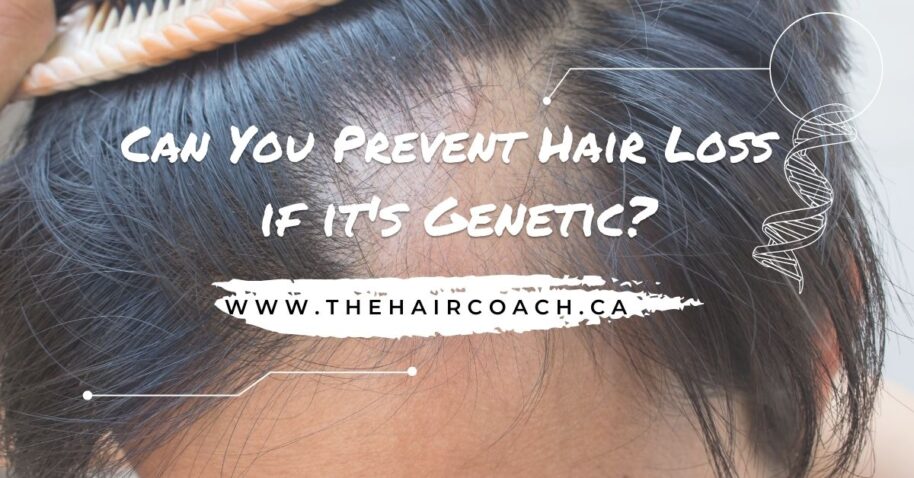Hair loss can be a frustrating and distressing experience for many people, especially if it runs in the family. The question on many people’s minds is whether or not it’s possible to prevent hair loss if it’s genetic. While there is no cure for genetic hair loss, there are several ways you can slow down the process and maintain a healthy head of hair. Additionally, biohacking, specifically epigenetics, has shown great potential in altering gene expression and potentially preventing hair loss.
Firstly, it’s important to understand the genetic basis of hair loss. Androgenetic alopecia, also known as male or female pattern baldness, is the most common form of hair loss, affecting up to 80% of men and 50% of women at some point in their lives. It is caused by a combination of genetic and hormonal factors, specifically the hormone dihydrotestosterone (DHT) which binds to and shrinks hair follicles, leading to hair loss over time.
While you can’t change your genetics, there are lifestyle factors you can control that may help slow down the process of hair loss. These include maintaining a healthy diet, exercising regularly, managing stress levels, avoiding smoking and excessive alcohol consumption, and using gentle hair care products. Additionally, there are medications such as finasteride and minoxidil that have been approved by the FDA for the treatment of hair loss and can help slow down the process.
Biohacking, specifically epigenetics, is a rapidly growing field that focuses on altering gene expression without changing the underlying DNA sequence. Epigenetic modifications, such as DNA methylation and histone modification, can be influenced by environmental factors such as diet, exercise, and stress, and may play a role in the development of hair loss. By manipulating these modifications through lifestyle changes and targeted interventions, it may be possible to alter gene expression and potentially prevent hair loss.
One example of how epigenetics could potentially prevent hair loss is through the use of histone deacetylase (HDAC) inhibitors. HDACs are enzymes that remove acetyl groups from histones, leading to a more compact chromatin structure and reduced gene expression. In hair follicles, decreased HDAC activity has been linked to the development of androgenetic alopecia. By inhibiting HDACs, it may be possible to increase gene expression and promote hair growth.
Another potential epigenetic target for preventing hair loss is the Wnt signaling pathway. The Wnt pathway is involved in the development of hair follicles and has been shown to play a role in the maintenance of hair growth. By activating this pathway, it may be possible to promote hair growth and prevent hair loss.
While there is no cure for genetic hair loss, there are several ways to slow down the process and maintain a healthy head of hair. Additionally, biohacking, specifically epigenetics, has shown great potential in altering gene expression and potentially preventing hair loss. By manipulating epigenetic modifications through lifestyle changes and targeted interventions, it may be possible to alter gene expression and promote hair growth. While more research is needed in this area, the potential benefits of epigenetic interventions for hair loss prevention are promising.
Epigenetic Test For Hair Loss
If you’re interested in exploring the potential benefits of epigenetic for hair loss prevention, you may consider taking an epigenetic test with a professional such as myself. An epigenetic test can provide insights into your unique genetic makeup and how your lifestyle choices and environmental factors may be impacting your gene expression and potentially contributing to hair loss.
As a hair coach, I can help you interpret the results of the test and develop a personalized plan to optimize your gene expression for hair growth and maintenance. This may include targeted lifestyle changes such as dietary adjustments, exercise routines, stress management techniques, and customized hair care practices.
I can provide personalized guidance and support for achieving your hair health goals, while also exploring the cutting-edge field of epigenetic and its potential benefits for hair loss prevention.
It’s important to note that while epigenetic interventions for hair loss prevention are promising, they are still in the early stages of research and more studies are needed to fully understand their effectiveness. It’s always important to consult with a healthcare professional before making any significant lifestyle changes or taking new supplements or medications.
Overall, exploring the potential benefits of epigenetic for hair loss prevention with a professional hair can provide a personalized and science-backed approach to achieving and maintaining healthy hair.


